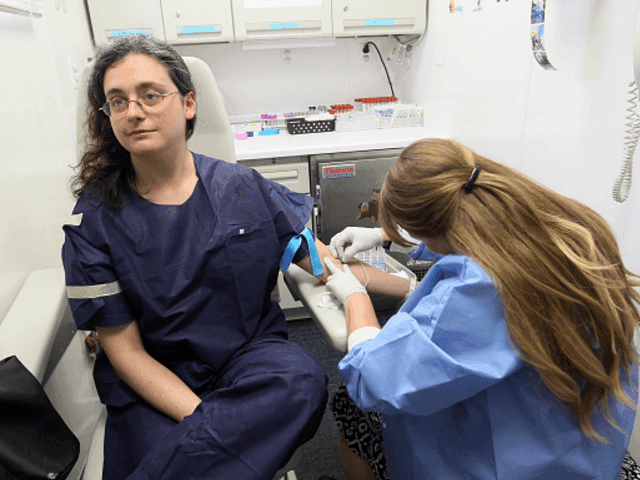Officials in San Antonio, Texas, worry that Zika virus may pose a serious threat to the local blood supply. They held a press conference Monday to address these concerns.
South Texas Blood and Tissue Center (STBTC) CEO Elizabeth Waltman cautioned: “Should Zika become widespread in Texas or other parts of the U.S., we will need to be supporting each other to ensure there is enough blood.”
In addition to Waltman, San Antonio Mayor Ivy Taylor, Bexar County Judge Nelson Wolff, officials from the San Antonio Metro Health Department and Chamber of Commerce, plus the U.S. Air Force participated in the press conference. Health officials urged residents to donate blood now while the supply is not tainted by Zika, meaning no local mosquitoes carry and transmit the virus.
The press conference also followed a week of torrential rain storms statewide where resulting standing water often proves to be breeding grounds for mosquitoes, in general, especially in warmer weather, now a heightened concern because of Texas’ proximity to Mexico, where local mosquitoes now carry and transmit Zika virus.
“We want to make sure that San Antonio residents dump any standing water near their homes at least once a week. Treat standing water that can’t be dumped with purification tablets,” commented Wolff, according to San Antonio’s KSAT 12.
Breitbart Texas reported the related fear is that Zika-carrying mosquitoes will cross over the border and infect Texans and Texas mosquitoes. Officials predict it is only a matter of time before a locally transmitted Zika case occurs and once this happens, it could pose a serious threat to the current blood supply, already suffering a shortage.
STBTC launched a Now More Than Ever campaign to encourage San Antonio residents to give blood, mainly because donations are down overall not just in San Antonio but around the country. The organization’s website notes the trade association for U.S. blood banks, the AABB, cited its most 2013 current statistics that blood donations were at the lowest point since they began keeping records in 1980, showing only 67 out of 1,000 people nationwide donated blood that year. “The national trend shows blood donations at the lowest level in 30 years,” commented Waltman.
This is compounded by Zika virus because it forced San Antonio health officials to turn away much needed blood donors, even if only temporarily. STBTC adopted the U.S. Food and Drug Administration’s (FDA) guidelines mandating potential blood donors who return from travel to Zika affected areas and those who display symptoms characteristic with the virus, wait one month before donating blood.
STBTC actually asks potential blood donors who traveled to Zika affected regions such as in South Asia, the Caribbean, Central and South Americas, or Mexico to wait 28 days upon returning before donating blood, even though there are no known cases of individuals infected with Zika though local mosquitoes in the state of Texas. Additionally, prospective donors who have had sexual contact with a person who just returned from travel to a Zika infested area must wait 28 days, since the virus also spreads through sexual contact. It can spread via blood transfusions as well.
“It’s a big impact on our supply and the availability of blood for people who are sick, going through chemotherapy, and people who are injured,” said Julie Vera, STBTC spokeswoman, who told San Antonio’s Fox 29 the current blood shortage in San Antonio could pose a serious problem if the Zika infection hits the area. That scenario could shut down all area blood donations. She added that presently the center feels the effects of the reduced number of donors within an area that includes Laredo, Eagle Pass, and Del Rio.
“People who have always donated blood we have to defer even if they only went to Mexico for a day,” she added. STBTC monitors blood donations for Zika virus. Vera worries the center could face empty or “really sparse” blood shelves over the summer months.
She urged: “Now more than ever, if you’ve ever considered donating, now is the time to do it.” She also told Fox 29: “We don’t know exactly what’s going to happen with Zika transmission this summer. We do know that every summer we have a drop off in our blood supply, so that coupled with the threat of Zika and any other virus that comes our way—it’s a really serious situation that we’re facing.”
The four known cases of the virus in San Antonio were acquired on travel outside the mainland in affected Zika infested regions, Mayor Taylor highlighted. Zika is the mosquito-borne virus now believed to cause the brain birth defect microcephaly in unborn babies and neurological disorders like Guillain-Barré syndrome, often a temporary paralysis.
Also Monday, Texas Lt. Gov. Dan Patrick requested a state committee hearing on the Zika virus and what actions are being taken to control the potential spread of the virus be held in May. “With increasing news concerning the Zika virus’ potential impact on Texas, and after several personal discussions with medical experts over the past few months, I believe it is time for the latest update in a public hearing,” said Patrick.
Follow Merrill Hope on Twitter @OutOfTheBoxMom.

COMMENTS
Please let us know if you're having issues with commenting.